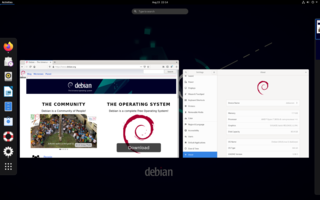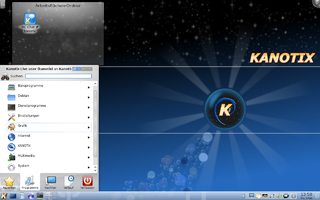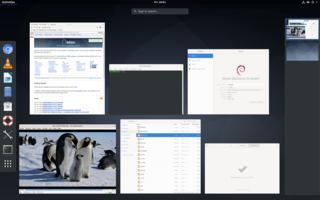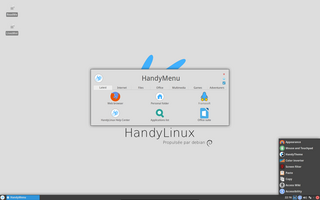
Debian, also known as Debian GNU/Linux, is a GNU/Linux distribution composed of free and open-source software, developed by the community-supported Debian Project, which was established by Ian Murdock on August 16, 1993. The first version of Debian (0.01) was released on September 15, 1993, and its first stable version (1.1) was released on June 17, 1996. The Debian Stable branch is the most popular edition for personal computers and servers. Debian is also the basis for many other distributions, most notably Ubuntu.

A Linux distribution is an operating system made from a software collection that includes the Linux kernel and, often, a package management system. Linux users usually obtain their operating system by downloading one of the Linux distributions, which are available for a wide variety of systems ranging from embedded devices and personal computers to powerful supercomputers.

Xfce or XFCE is a free and open-source desktop environment for Linux and Unix-like operating systems.

The Linux Standard Base (LSB) was a joint project by several Linux distributions under the organizational structure of the Linux Foundation to standardize the software system structure, including the Filesystem Hierarchy Standard used in the Linux kernel. LSB was based on the POSIX specification, the Single UNIX Specification (SUS), and several other open standards, but extended them in certain areas.

Kanotix, also referred to as KANOTIX, is an operating system based on Debian, with advanced hardware detection. It can run from an optical disc drive or other media i.e. USB-stick without using a hard disk drive.
Arch Linux is a Linux distribution created for computers with x86-64 processors. Arch Linux adheres to the KISS principle. The project attempts to have minimal distribution-specific changes, and therefore minimal breakage with updates, and be pragmatic over ideological design choices and focus on customizability rather than user-friendliness.

CentOS is a Linux distribution that provides a free and open-source community-supported computing platform, functionally compatible with its upstream source, Red Hat Enterprise Linux (RHEL). In January 2014, CentOS announced the official joining with Red Hat while staying independent from RHEL, under a new CentOS governing board.
Technical variations of Linux distributions include support for different hardware devices and systems or software package configurations. Organisational differences may be motivated by historical reasons. Other criteria include security, including how quickly security upgrades are available; ease of package management; and number of packages available.

Debian-Installer is a system installer designed for the Debian Linux distribution. It originally appeared in the Debian release 3.1 (Sarge), released on June 6, 2005, although the first release of a Linux distribution that used it was Skolelinux (Debian-Edu) 1.0, released in June 2004.
In 2006, a branding issue developed when Mike Connor, representing the Mozilla Corporation, requested that the Debian Project comply with Mozilla standards for use of the Thunderbird trademark when redistributing the Thunderbird software. At issue were modifications not approved by the Mozilla Foundation, when the name for the software remained the same.

gNewSense is a Linux distribution that was active from 2006 to 2016. It was based on Debian, and developed with sponsorship from the Free Software Foundation. Its goal was user-friendliness, but with all proprietary and non-free software removed. The Free Software Foundation considered gNewSense to be composed entirely of free software.

Linux Mint is a community-driven Linux distribution based on Ubuntu, bundled with a variety of free and open-source applications. It can provide full out-of-the-box multimedia support for those who choose to include proprietary software such as multimedia codecs.
GNU variants are operating systems based upon the GNU operating system. According to the GNU project and others, these also include most operating systems using the Linux kernel and a few others using BSD-based kernels.

Bharat Operating System Solutions is an Indian Linux distribution derived from Debian. BOSS Linux is officially released in four editions: BOSS Desktop, EduBOSS, BOSS Advanced Server and BOSS MOOL. The latest stable version 8.0 ("Unnati"), was released on 11 July 2019.

CrunchBang Linux was a Linux distribution derived from Debian by Philip Newborough.

RPM Package Manager (RPM) is a free and open-source package management system. The name RPM refers to .rpm file format and the package manager program itself. RPM was intended primarily for Linux distributions; the file format is the baseline package format of the Linux Standard Base.

antiX is a Linux distribution based on Debian Stable. It is comparatively lightweight and suitable for older computers, while also providing cutting edge kernel and applications, as well as updates and additions via the apt-get package system and Debian-compatible repositories. Since version 19 it comes in two init system flavours: sysVinit and runit.

Debian releases do not follow a fixed schedule. Recent releases have been made roughly biennially by the Debian Project.

HandyLinux is a simplified Linux distribution operating system developed in France. Derived from the Debian stable branch, it was designed to be easily accessible so that it could be the used by people with very little experience with computers. HandyLinux is easily downloadable, allowing for it to be used on a range of older hardware that is no longer supported by the latest versions of proprietary operating systems. It is particularly aimed at older people with dated hardware who do not need nor possess the skill to use many features afforded by state-of-the-art operating systems. It may also be useful for computer users with disabilities, such as visual impairment.

MX Linux is a midweight Linux operating system based on Debian stable and using core antiX components, with additional software created or packaged by the MX community. MX Linux was developed as a cooperative venture between the antiX and former MEPIS communities. The MX 'name' came from the M for MEPIS and the X from antiX - an acknowledgment of their roots. The community's stated goal is to produce "a family of operating systems that are designed to combine elegant and efficient desktops with high stability and solid performance".















